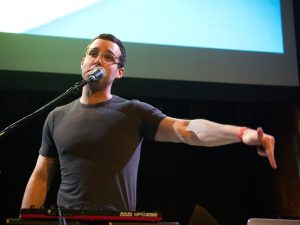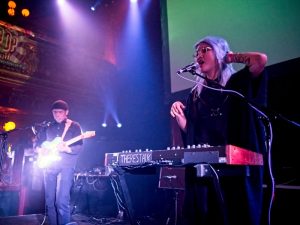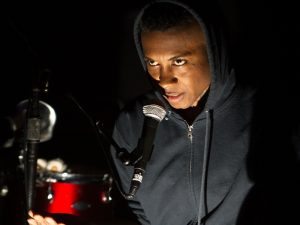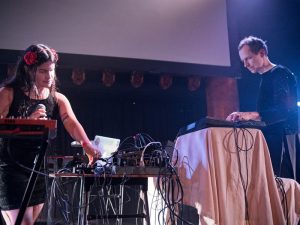Noise Pop Review: Baths turn it off and back on again at GAMH

Baths perform at Noise Pop at Great American Music Hall in San Francisco on Feb. 27, 2019. Photos: Gary Chancer.
SAN FRANCISCO — It’s annoying when your laptop crashes. Now imagine it happening—repeatedly—in the middle of your set in front of a huge crowd at the Great American Music Hall during the Noise Pop Music Festival. This was the nightmare that Baths, aka Will Wiesenfeld, weathered with good humor. After setting up his gear onstage Wiesenfeld told the crowd, “This is my first headlining gig in five or six years, and I’m sure I’ll fuck it up at some point.”
Instead, it was his technology, specifically an underpowered USB tree, that repeatedly sabotaged the show.
“Don’t worry, I’m good,” said Wiesenfeld, looking like a cross between Mark Zuckerberg and the “Can you hear me now?” Verizon guy (who’s now with Sprint).
The audience didn’t seem to mind much either when things went awry, staring instead at their phones, while Wiesenfeld and the sound tech fixed the problem. Later in the show, after another round of system crashes, Wiesenfeld asked the crowd, “Is it OK? Are you having a good time?” Fans cheered in response. Clearly they were willing to put up with some technical difficulties to see the popular electro-gaze artist.
Eventually the problem was solved by turning the computer off, then turning it back on again. Who knew?
Hailing from Tarzana, California, Wiesenfeld produces his music using a laptop and various interfaces, including the aforementioned USB tree. The high-fidelity samples and recordings used in the music sounded glitchy under Wiesenfeld’s control. Filtered notes and fluttering overtones swapped places. Like an errant radio dial in search of a clear signal, the music jumped from one sonic element to the next, somehow retaining some element of groove as evidenced by the crowd, nodding their heads in unison. This wasn’t exactly dance music, but rather music to twitch to.
Baths was playing Noise Pop in support of its third LP, Romaplasm, released last November by Anticon. Wiesenfeld’s classical music training was evident as he delivered a powerful rendition of “Extrasolar” from his latest album. Other standout tracks included “Ocean Depth” from his 2014 album of the same name, and “Lovely Bloodflow” from 2010’s Cerulean.
The four-act bill began earlier with Oakland’s There’s Talk, a trio consisting of two keyboardists and a guitarist whose guitar sounds like a keyboard. The band’s set of competent shoegaze evoked comparisons to The Cocteau Twins.
Singer and keyboard player Olivia Lee joked with the crowd between moody and atmospheric songs from the band’s latest EP, bathed water moon. Guitarist Young Lee added rich backing vocals when he wasn’t hunched over his extensive pedalboard, further dialing in the gauzy clouds of sound behind Olivia Lee’s cat-fur soft voice.
Also on the bill was Oakland’s Wizard Apprentice, aka Tieraney Carter, an experimental singer and digital artist. She interacted with a video display behind her as she recounted her escape from a toxic relationship. With a just a drum, a laptop and stark lighting, Wizard Apprentice created dramatic effects amid powerful, personal revelations.
Very much in the vein of Laurie Anderson, or updating the sex-infused performance art of Karen Finley, Wizard Apprentice’s performance was captivating, funny and provocative. The music was lo-fi, gritty and incorporated some elements from hip-hop and experimental electronic music. The performance ended with Wizard Apprentice pantomiming washing the toxicity of the relationship from her body.
Mills College graduate student Briana Marcela, studying electronic music and recording media., opened the show. Her performance featured yet another card table covered with laptops, keyboards and mixers, which allowed her and her two accompanists to create her lush brand of synth pop. Dressed in a black dress and sporting a bright red headband, Marela performed the most conventionally “pop” music of the evening, replete with the requisite ooohs and aaahs.
A bass player joined the duo for the second and third song, adding some bottom-end heft on the songs after some sound problems were worked out. The music was polished, but strange and somehow simultaneously inviting and intriguing.
All of the bands on the bill relied on technology, and the gear proved to be both a help and a hindrance. But in each case, these artists were able to inject some humanity into the circuits and semi-conductors arrayed before them. The glitchy feel of Baths’ frenetic songs, the polished fidelity of There’s Talk’s melancholia, the emotional intimacy of Wizard Apprentice and the synthetic sweetness of Briana Marela’s pop all testify to what humans can accomplish with the help of technology. But of course the technical problems also highlighted the liabilities in our reliance on machines to make art.
- Baths perform at Noise Pop at Great American Music Hall in San Francisco on Feb. 27, 2019.
- Baths perform at Noise Pop at Great American Music Hall in San Francisco on Feb. 27, 2019.
- Baths perform at Noise Pop at Great American Music Hall in San Francisco on Feb. 27, 2019.
- Baths perform at Noise Pop at Great American Music Hall in San Francisco on Feb. 27, 2019.
- Baths perform at Noise Pop at Great American Music Hall in San Francisco on Feb. 27, 2019.
- Baths perform at Noise Pop at Great American Music Hall in San Francisco on Feb. 27, 2019.
- Baths perform at Noise Pop at Great American Music Hall in San Francisco on Feb. 27, 2019.
- Briana Marela performs at Noise Pop at Great American Music Hall in San Francisco on Feb. 27, 2019.
- Briana Marela performs at Noise Pop at Great American Music Hall in San Francisco on Feb. 27, 2019.
- Briana Marela performs at Noise Pop at the GAMH in San Francisco on Feb. 27, 2019.
- Wizard Apprentice performs at Noise Pop at Great American Music Hall in San Francisco on Feb. 27, 2019.
- Wizard Apprentice performs at Noise Pop at Great American Music Hall in San Francisco on Feb. 27, 2019.
- There’s Talk performs at Noise Pop at Great American Music Hall in San Francisco on Feb. 27, 2019.
- There’s Talk performs at Noise Pop at Great American Music Hall in San Francisco on Feb. 27, 2019.
- There’s Talk performs at Noise Pop at Great American Music Hall in San Francisco on Feb. 27, 2019.
- There’s Talk performs at Noise Pop at the GAMH in San Francisco on Feb. 27, 2019.
Follow writer David Gill at Twitter.com/Songotaku.




















